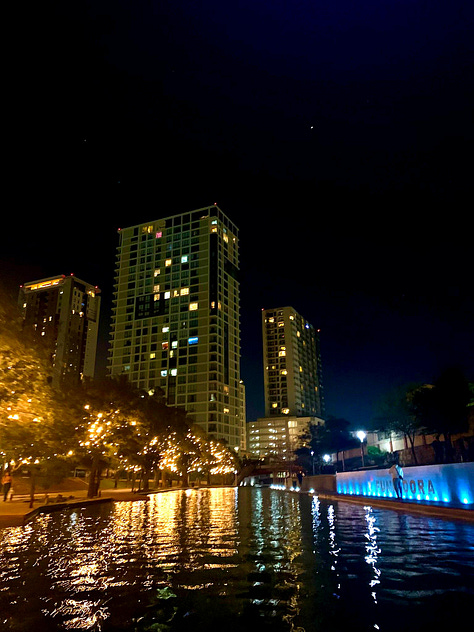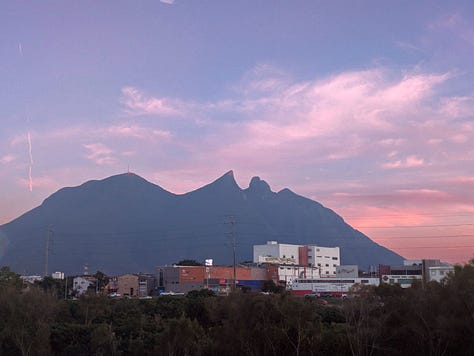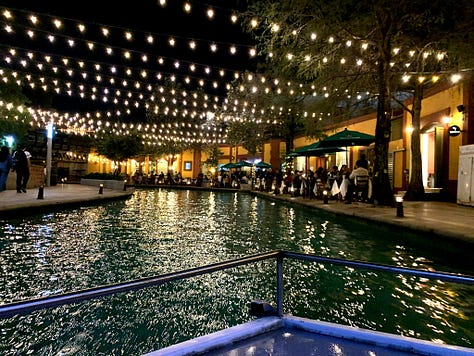Last post of the year. Thank you for a fantastic 2024! Highlights include: I revamped the dumbphone finder, created the initial lessons of the Low Tech Course, and started coaching people on their digital minimalism journey.
I'm grateful for everyone who purchased Low Tech Life and provided feedback. It was an amazing 2024, and I'm excited for what 2025 will bring (Light Phone 3, Mudita Kompakt, and other offline projects, so stay tuned!).
More offline, less online! :)
Adah Salazar can’t remember much anymore. At 95, you can’t really fault her. Yet, every time my wife sits down with her grandma, the stories and facts she does remember are filled with unadulterated joy. Adah spent her entire life in Mexico. As the wife of a preacher, she grew accustomed to the constant relocating of her family—from Mexico City to Tabasco and finally to the north in a small community where retirement awaited. She worked tirelessly at the hospital while raising two boys. She was firm, but felicitous. She completed a fulfilling work journey, watched her boys embark on their careers, and settled into her cozy home for the final chapter of her life. I don’t know every aspect of her journey, but what I do know is that as it draws to a close, her eyes are filled with contagious jubilation.
I want to grow up and be like Adah. Just like her, I know my memory will eventually falter, but I want my memories to be truly mine. Much of the online world holds fragments of my life, forgotten Facebook posts and distant Instagram updates. None of these give me any real satisfaction or lasting value. Our species has a unique way of linking memories to physical objects. That’s why you still remember the photo albums your mom meticulously curated and stored in the middle drawer, second row, in the living room console. It’s the reason the picture beside your nightstand or nailed to the living room wall can be recalled almost instantly. Not only its placement but the memory of the event itself is etched in your mind.
When you laugh or reminisce about past experiences, a memory dividend triggers. Typically associated with finances, dividends are a small return from your investment in a company. Memory dividends, however, are the return on investment you receive from the joy of past events. Think of that trip to the mountains where you bathed under a waterfall, the beach visit where you forgot sunscreen and ended up with a red nose, or the time you joined a pickup basketball game and almost dunked (it felt awesome even if you didn't quite make it).
In the grand scheme of life, memories are the currency we cherish most as we near the end of our journey. While many people spend considerable time optimizing their bank accounts, Bill Perkins, author of Die with Zero, argues that we should be optimizing for the highest amount of life enjoyment. This is where memory dividends come into play. Today, I'll share three small suggestions to optimize both your financial and memory dividends.
Stop Thinking About Money
Society often lays out a familiar pattern: 16 years of schooling, followed by 40 years of work, all while saving and accumulating wealth to enjoy our final years. But those later years often come with health challenges and reduced energy, limiting opportunities to travel or create new memories. As a result, the window for meaningful experiences narrows. That’s why it’s crucial to start creating memories early, allowing them to compound over time and bring joy whenever they resurface. The earlier we invest in experiences, the greater the return.
Sometimes, making those memories requires money. A trip to a foreign destination? Dollars. Dinner at a Michelin-starred restaurant? Cash. A car to visit the local free monument? Cha-ching! Navigating society means understanding how to manage money. But here’s the paradox: the less money you have, the more it dominates your thoughts.
When I first came to this country, money was all I thought about. My dad and I lived in a small basement that served as our kitchen, bathroom, laundry room, and bedroom. It was cramped, but it was all we could afford. We struggled those first few months, even going a bit hungry on Thanksgiving. Money was tight, and my thoughts were consumed with how to get more of it.
Eventually, I did get more. I went to school, got a job, and started living what I thought was "the life." Money began flowing into my bank account, but it flowed out just as quickly. I realized that earning money was one thing, but managing it was another skill entirely. Without proper organization, money was constantly on my mind. Even during those lean early years, when my dad and I didn’t have much, we still managed to create memories. Visiting the National Harbor, driving to Florida to see friends, and exploring the historic sites of the National Mall were some of them. But because our money was disorganized, it never grew, and the worry over it never stopped.



Then, I did something that most people don’t: I read a personal finance book. I Will Teach You To Be Rich caught my eye at the library, and I picked it up, hoping to discover a secret formula for wealth. Back then, I was focused on chasing the numbers game, the narrative capitalism sold me. But the book shifted my mindset. It taught me that being rich isn’t about accumulating vast amounts of money. It’s about defining what you want your life to look like and making money a tool to achieve it.
This was a new perspective for me. I had always thought money had to be at the forefront. But as I read more books, I began to develop stronger money management skills, such as organization and automation. Whether your income is high or modest, how you handle money matters more than the balance in your bank account. By automating saving, spending, and investing, I freed myself from constantly worrying about finances. That shift made it easier to focus on creating memories.
I started small. A mere $5 every Tuesday, transferring it from my checking to my savings account. As my income grew, so did that amount. Over time, I paid off my student loans, built up an emergency fund, and started working toward the financial life my wife and I envisioned. But I don’t obsess over the details anymore. Automation takes care of the numbers, allowing me to focus on what really matters: the experiences and memories I want to create.
Today, money funds the life I want. It’s paying for an upcoming trip to Germany, dinner at Wolf’s Tailor with friends in February, and a visit to Aspen in March. Money has become a background activity—still important, but no longer consuming my thoughts. Achieving this balance took effort and focus on organization, but it’s what allowed me to make memories the top priority.
Action Item: Read one personal finance book that focuses on teaching money skills. Top candidates include: I Will Teach You To Be Rich, Your Money or Your Life, and Love Your Life, Not Theirs.
Prioritize Memories Over Work
And then there’s time, our most precious resource. Unlike money, we can’t earn more of it, we spend it every single day. A few weeks ago, I made a graph for a PowerPoint party, and as I presented on the topic of this newsletter, I realized something striking: the red-shaded area of the graph represented the optimal period for making memories. Regardless of financial circumstances, this is the time when we have the greatest potential to create experiences that yield dividends in the years to come. For example, if you went skydiving or backpacked through Europe in your 20s, those memories will bring joy and meaning for decades. But by the time you’re in your 50s, participating in such thrilling activities becomes more challenging. This is why our "memory capacity" (MCapacity) declines with age, life’s constraints limit the number and type of experiences we can pursue.
To make the most of this, we must actively prioritize experiences in our calendars. Over the past nine years working in non-profits, I’ve learned a key truth that applies to many industries: if you don’t fill your calendar, someone else will. If I failed to schedule and communicate my vacation time, it was assumed I was available for work. For much of my 20s, that’s exactly what I did. Looking back at my vacation history, I realized I had only taken 14 days off in the past three years. While I love my work, I’ve been doing it at the expense of my memory-making capacity, and I’m not alone, many of us fall into the same trap.
Most estimates suggest we have about 4,000 weeks of life. Rather than seeing this as a depressing number, I find it empowering, it motivates me to make the most of the weeks I have left. If there’s one thing I’ve learned in my 1,500 weeks so far, it’s this: no one will remember the extra week you spent grinding away on a project, but you’ll never forget the week you spent in Japan climbing Mt. Fuji (a goal I’ve set for 2026 😊). That’s why getting intentional about scheduling breaks and prioritizing memory-making experiences is so essential.
If you want to take this exercise a step further, consider the new possibilities offered by the modern work landscape. Imagine spending a year traveling and working remotely. It might require taking a pay cut or learning new skills, but it’s just 52 weeks out of the 4,000 you’ll live. 1% of your life, yet it could account for 20-30% of your most cherished memories. You don’t need to rush to make this happen. Maybe you save steadily over 10 years or plan to take a full month off every two years. Whatever approach works best for you, the key is to be intentional. Set aside time to replenish your memory bank, prioritize joy, and maximize the richness of your life.
Action Item: Schedule three breaks during 2025. Plan for a week-long vacation, a weekend getaway, and a random two-day stretch. Use these breaks to make memories and rest.

Human Likes, Not Digital Ones
My final suggestion, and perhaps the most impactful action item, is to take control of your digital consumption. Since 2014, we’ve become increasingly accustomed to living through our screens. Social media platforms have evolved into content factories, feeding us a constant stream of idealized experiences. From the serene beaches of Bali to the vibrant streets of Marrakesh, there’s always a TikTok or Instagram account ready to present a version of life so captivating it feels almost within reach. But that’s the catch—it’s not. These platforms offer an illusion, a fleeting escape from reality that might make you feel good for a few seconds, until you swipe up to consume the next reel, leaving behind only a hollow sense of longing.
The truth is, the memories that truly stick with us, the ones we treasure most, are rarely the ones mediated through a screen. Instead, they are the moments we experience with the people we love, fully present as we feel the warmth of the sun on our skin, the texture of sand running through our fingers, the sounds and smells of a bustling market, or the rush of adrenaline as we step into the unknown.
If you’ve ever dreamed of walking along the Great Wall of China, hiking through the Swiss Alps, or exploring the ancient ruins of Machu Picchu, make it more than a dream. Plan for it. Save for it. Invite your friends to come with you. See it with your own eyes and feel it with your own senses. No filter or perfectly edited video can ever replace the joy of being there yourself. Life is meant to be lived, not just watched. So, take that first step—whether it’s setting aside a small amount each month for travel or researching the logistics of your dream trip. The effort you put into creating real experiences will pay off in memories that no algorithm can deliver.
As Adah walks into her living room, dealing with early-onset Alzheimer's, she experiences the room anew each day. She asks me what my name is and who I am. I answer like I did yesterday. But her gaze doesn’t disappoint. She cares for me even if she does not remember who I am. She asks me whether I’d like to eat, she laughs and tells me about her granddaughter who I should meet and maybe take on a date. She doesn’t remember that I already did that. I married her, in fact.
Adah's condition is a poignant reminder that our memories are precious, and the time we have with loved ones is limited. Prioritize making memories with others while you can still remember. Plan those trips, savor those moments, and cherish the time you have with the people you love. Life is too short to let it pass by unexperienced.
Action Item: Make memories. Make them fast. Make them now.





Memory making trips and adventures are always wonderful. Don't forget memories can be made right in your home too. Life is precious every day and finding joy in the "mundane" is so important!
I enjoy reading your newsletter. This one particularly hit home for me. My husband and I live like this, where we treasure experiences. It can be hard for others to understand. I've been told that we are "brave". We have moved around the country, made lifelong friends, and made memories we cherish. We wouldn't trade it for anything. Life is an adventure to be embraced!